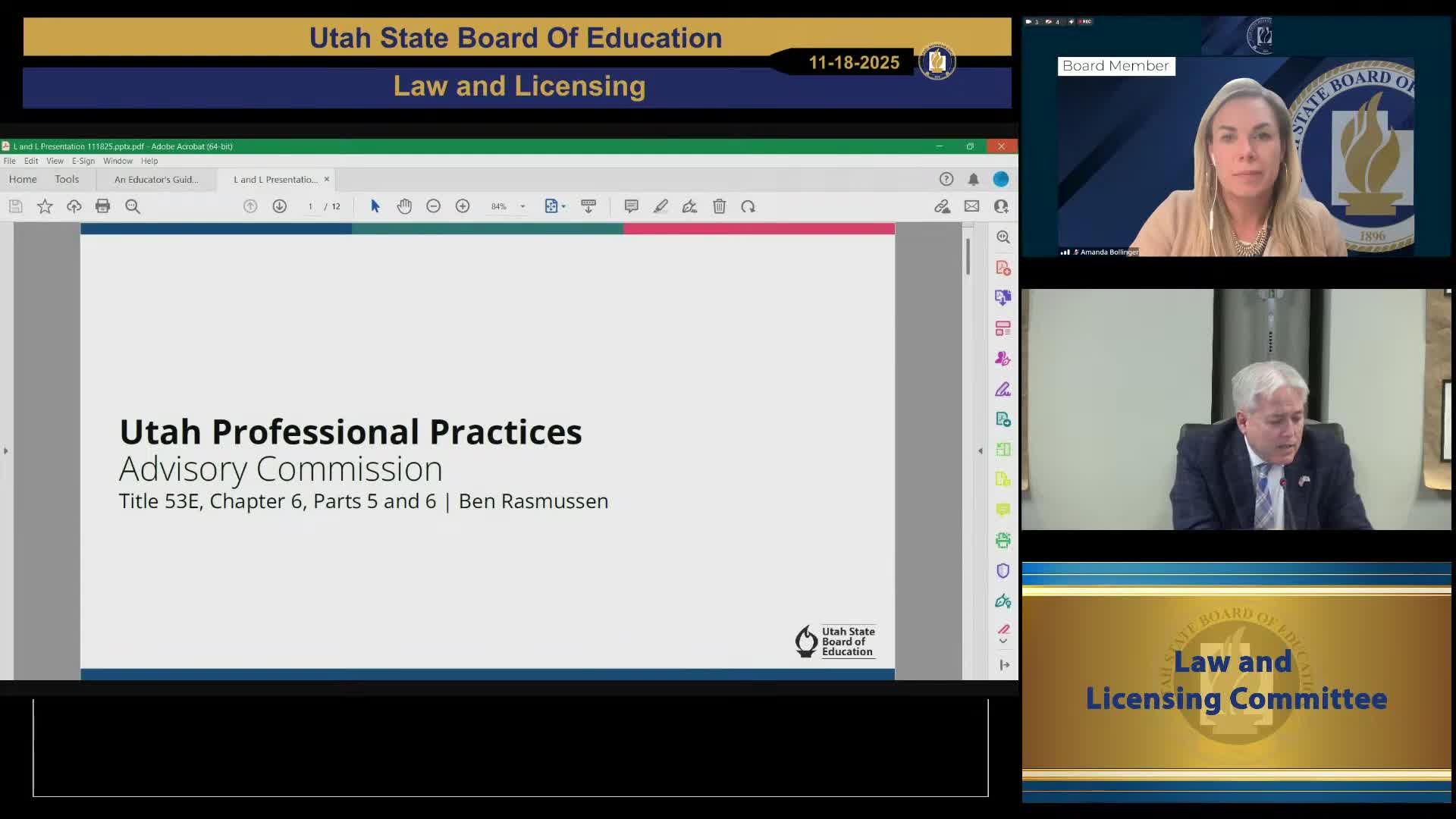Board committee questions UPAC intake, notice and data as referrals spike
Get AI-powered insights, summaries, and transcripts
Subscribe
Summary
A board fact-finding committee pressed UPAC staff on why LEA referrals lead to far more opened investigations than parent referrals, how evidence and 'cactus' flags are handled, and why UPAC lacks a written conflict-of-interest policy as caseloads surge.
A board committee met to review how the Utah Professional Practices Advisory Commission (UPAC) receives referrals, opens investigations and shares evidence, as staff detailed a marked increase in caseloads since 2024 and members pressed for clearer notice and better data tracking. Chair Carrier framed the meeting as a fact-finding review, saying the panel "is really just gather[ing] information" and will not change rules during the process.
Ben Rasmussen, UPAC's executive director, told the committee UPAC's statutory responsibilities include "investigat[ing] educator misconduct," holding hearings and making recommendations to the state board (citing a code reference presented verbally in the meeting). Rasmussen said referrals arrive through a Qualtrics form on the agency website, direct email and an audit hotline, and that staff follow up to confirm jurisdiction because "UPAC under the statute can only . . . has jurisdiction over licensed educators." He described a triage and agenda process in which staff compile materials into a packet for commissioners to decide whether to open a case.
The committee focused on three recurring concerns: rising referrals and capacity, timing and specificity of notice to educators, and records, data tracking and disclosure. Rasmussen presented statistics showing a recent increase in work: monthly referrals rose from roughly 16 to a June high of 74 and staff reported the commission "has opened 204 cases" this year and has about "148 open cases" in active investigation. "We could use some more staff," he told the group, noting UPAC has three people handling investigations and has requested additional attorney positions.
On notice to educators, members said teachers sometimes learn only when a UPAC flag is placed on their record. Chair Carrier said he was "deeply concerned" that, in the "overwhelming number of cases," the decision to open an investigation is made without educators having an opportunity to address allegations. Rasmussen responded that UPAC generally does not notify an educator at referral intake and notifies only when a case is opened: "We don't notify the educator when the referral is received." He argued most LEAs notify educators and said delaying formal notice reduces risk of unnecessary alarm and potential evidence tampering.
Vice Chair Bollinger, citing student-protection priorities, countered that providing too much pre-opening detail could allow an educator to "destroy evidence," and urged caution. Ashley Carter, a UPAC attorney who compiled the agency's trend charts, said disciplinary outcomes are increasing across categories and that some more serious matters are now reaching UPAC.
Members also pressed staff about the content and timing of disclosure to respondents. Rasmussen explained UPAC maintains a case file (administrative correspondence) and an evidence file (investigator/attorney work product) and said evidence is generally provided to educators in conjunction with a formal complaint or when a hearing is scheduled. He confirmed that when UPAC places what staff described as a "cactus flag" on an educator's record the flag typically remains until the board acts: "Prior to a hearing on, no" the flag is removed.
The committee noted gaps in routine data tracking. Rasmussen and Joanna Bell, an attorney working with UPAC, said historical records and agendas exist but that referral-source and outcome breakdowns (for example, counts by license area or how many parent referrals later resulted in formal UPAC investigations) were not consistently tracked in a single database and would require reconstructing files. Rasmussen estimated some targeted requests could be fulfilled in hours, but broader data reconstruction across multiple years would take weeks. Deputy Nooyi said the agency's internal control work will include building better data systems to make UPAC information more accessible to board members and legislators.
Committee members also flagged governance concerns. Rasmussen said UPAC currently has no written conflict-of-interest policy; "when there are conflicts of interest, the members recuse themselves" but there is no formal, written policy or recordkeeping of recusals until recently when motions and recorded votes became more routine.
The committee did not take substantive votes on UPAC policy at this meeting. Members asked staff to produce targeted data on referral sources and outcomes and discussed whether changes to statutory or rule requirements (including mandatory LEA reporting of parent complaints) should be pursued to reduce low-merit referrals and focus investigative resources. Rasmussen said staff will help compile requested information and reiterated that extra staff would be the clearest way to reduce delays. The meeting adjourned on a unanimous motion.
